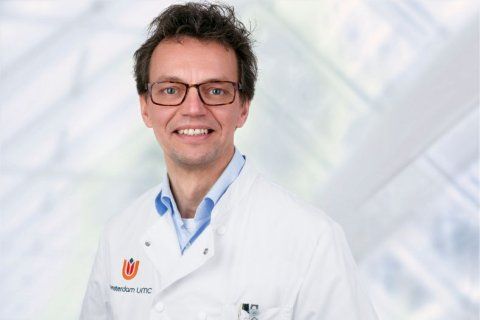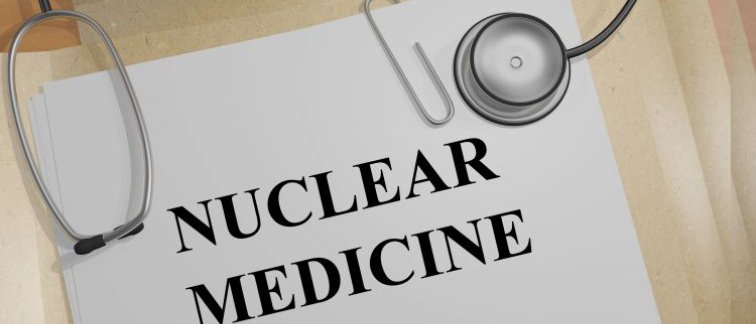Harry Hendrikse, a professor of clinical radiopharmacology, clinical pharmacologist and hospital pharmacist at Cancer Center Amsterdam, has been appointed as an advisor of FIELD-LAB, a collaboration between academic and industrial partners to promote drug discovery in radionucleotide medicine. Prof. Hendrikse foresees great possibilities for expanding patient treatment with lutetium-177, despite some issues related to market availability.
The market for lutetium-177, an isotope used for the radiolabeling of pharmaceutical molecules, is expected to grow considerably in the coming years. Lutetium-177 emits short-range radiation that has shown to be highly efficient in killing tumor cells with minimal irradiation of healthy tissues. There are many products in the clinical pipeline that use lutetium-177 as radioactive substance to target isolated tumor cells, and recent publications are reporting great response and prolonged survival for some patients in clinical trials.
A ‘theranostic’ approach
"At Amsterdam UMC, patients who are suspected of having a prostate carcinoma are first administered a diagnostic tracer for imaging with positron emission tomography (PET)", says Prof. Hendrikse. Because the tracer is linked to a radioactive PET isotope, tumors become visible on the scan to doctors, enabling effective diagnosis of a prostate carcinoma.
In addition to establishing the diagnosis, Cancer Center Amsterdam is working hard on a medicated therapy to treat metastatic prostate cancer. One of the highly-promising new experimental treatment approaches is lutetium-177 linked to prostate specific membrane antigen (lutetium-177-PSMA)

“Currently, two PhD students at Cancer Center Amsterdam are performing research on lutetium-177-PSMA to find answers to several remaining clinical questions,” says Prof. Hendrikse. "The research is aimed at a theranostic approach. This means that the radiopharmaceuticals can be deployed for both diagnosis and treatment.”
Lutetium-177 for treating other tumor types
Lutetium-177-PSMA has received a lot of attention within urology, but PSMA expression can also occur in other types of tumors, including brain cancer and pancreatic cancer. Researchers from the neuro-oncology group at Cancer Center Amsterdam are also looking into the potential of lutetium-177 to treat glioblastoma, according to Prof. Philip de Witt Hamer.
“Patients with glioblastoma have a very short life expectancy. The problem is that the brain does not allow for radical surgical removal or radiation and the tumor escapes chemotherapy, so that the remaining tumor recurs after current treatments. A highly targeted eradication of tumor cells such as by radioactive tracers holds an interesting potential. Preliminary preclinical data is encouraging, and therefore we now explore means to translate this to treatment for patients,” says Prof. de Witt Hamer.
Limited lutetium-177 supply
Patients are not yet treated with lutetium-177 at Amsterdam UMC as part of regular care. "But very soon we will have enough therapy rooms to start the studies with lutetium-177 in patients," said Prof. Hendrikse. To be able to execute these studies, an isotope from the nuclear reactor in Petten, the Netherlands, is needed which is subsequently processed into a GMP qualified product suitable for administration to patients. This is produced by FIELD-LAB partner, the Nuclear Research and Consultancy Group (NRG), the most important producer of radionuclides in Europe and operators of the Petten nuclear reactor.
FIELD-LAB
FIELD-LAB is a drug discovery facility and a consortium of different public and private partners such as NRG, Amsterdam UMC and other medical universities. The aim is to accelerate the research and development of nuclear drugs and to facilitate clinical studies in order to develop new nuclear cancer therapies.
FIELD-LAB is dedicated to finding solutions to meet the future demand of lutetium-177. They are striving to process lutetium-177 into LuCl3 (lutetium trichloride, the radioactive compound used to make the nuclear medicine) under GMP conditions for clinical applications.
Prof. Hendrikse: “At the moment there are only two major isotope suppliers on the market. The limited availability of lutetium-177 can sometimes make it difficult for us to perform certain studies. That is why I am pleased that NRG is doing its best to make this resource available through FIELD-LAB,” says Prof. Hendrikse.
For more information contact Professor Hendrikse (nh.hendrikse@amsterdamumc.nl).
People involved at Cancer Center Amsterdam:
Harry Hendrikse, a professor of clinical radiopharmacology, clinical pharmacologist and hospital pharmacist
This article was adapted from: ‘Harry Hendrikse over de toekomst van lutetium-177’ on the website of NRG by Esméé Joosten and Laura Roy.

